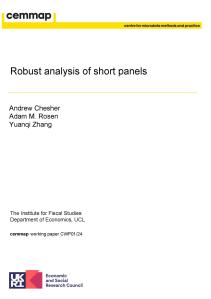Income inequality, as well as the impact of tax and benefit reforms on it, has typically been evaluated with respect to ‘snapshot’ incomes, measured over short periods such as one week or year. But longitudinal data allows long-run measures of income to be used, which will be of interest to policymakers interested in persistent, rather than only temporary, poverty. We show that the long-run distributional impact of a reform is the combination of three effects: a ‘static’ effect, which would be observed if individuals’ circumstances were consistent throughout their life; an ‘income dynamics’ effect, resulting from individuals moving around the income distribution over time; and a ‘tagging’ effect, resulting from the reform affecting individuals differently according to whether they have a characteristic predictive of long-run income conditional on current income. We propose a simple method to decompose these three effects for any inequality, poverty, or distributional statistic. We use the method to examine the distributional impact of the introduction of ‘Universal Credit’, the most important reform to the UK benefit system in decades. We show that Universal Credit is less regressive on a long-run basis than a snapshot one, partly because of income dynamics but also because it reduces entitlements for (or ‘negatively tags’) those who are more likely to find a period of low income to be temporary, rather than persistent.











